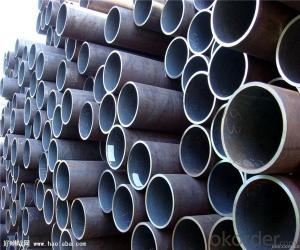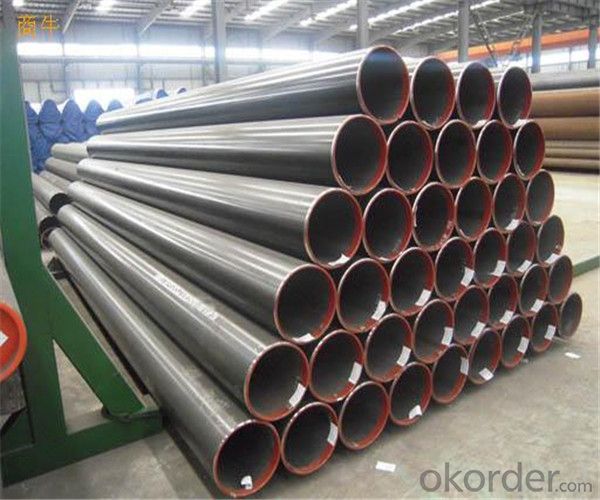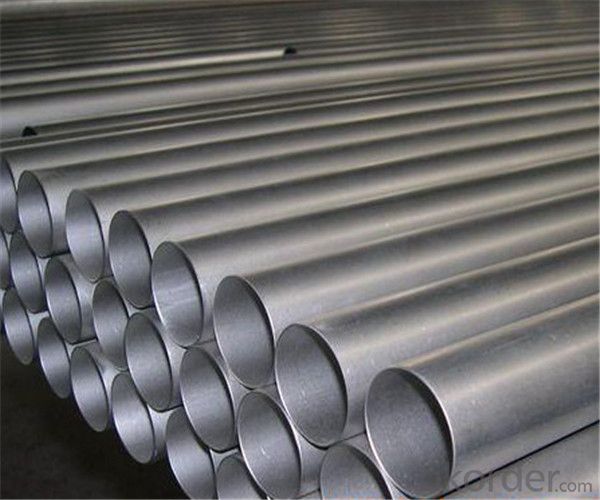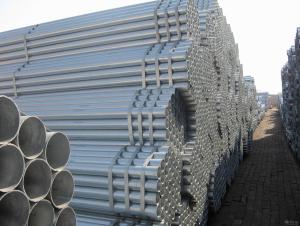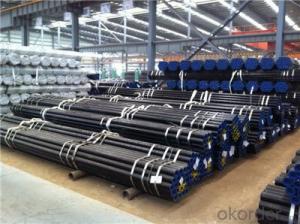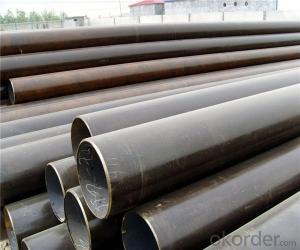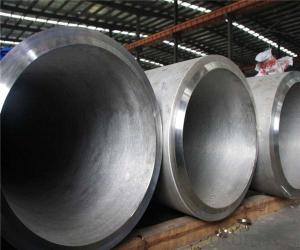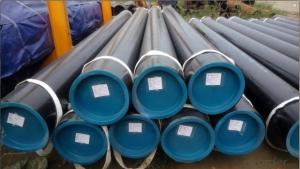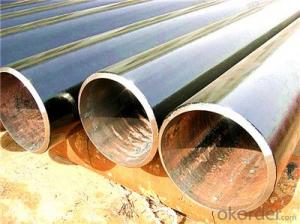2016 high quality CNBM seamless steel pipe
- Loading Port:
- Tianjin
- Payment Terms:
- TT or LC
- Min Order Qty:
- 100 m.t.
- Supply Capability:
- 3000000 m.t./month
OKorder Service Pledge
OKorder Financial Service
You Might Also Like
PRODUCT DETAILS
1.Structure of Seamless Steel Pipe Description:
A large amount of Seamless Steel Pipes is offered to the clients at cost effective rates. These pipes are extremely durable, resistant to corrosion and have high tensile strength. Our pipes are used in nuclear plants, power plants, refineries and construction industry across the country. Furthermore, we are capable of providing these seamless pipes to the clients in bulk quantity.
2.Main Features of the Steel Pipe:
• High manufacturing accuracy
• High strength
• Small inertia resistance
• Strong heat dissipation ability
• Good visual effect
•Reasonable price
3.Packaging & Delivery:
| Packaging Details: | Seaworthy packages, bundles wrapped with strong steel strip |
| Delivery Detail: | 15-30 days after received 30% TT |
4.Seamless Steel Pipe Specification:
| Standard: | GB, DIN, ASTM,ASME, ASTM A106-2006, ASTM A53-2007 |
| Grade: | 10#,20#, 45#, 16Mn |
Thickness: | 8 - 33 mm |
| Section Shape: | Round |
| Outer Diameter: | 133 - 219 mm |
| Place of Origin: | Shandong, China (Mainland) |
| Secondary Or Not: | Non-secondary |
| Application: | Hydraulic Pipe |
| Technique: | Cold Drawn |
| Certification: | API |
| Surface Treatment: | factory state or painted black |
| Special Pipe: | API Pipe |
| Alloy Or Not: | Non-alloy |
| Length: | 5-12M |
| Outer Diameter: | 21.3-610mm |
5.Product pictures
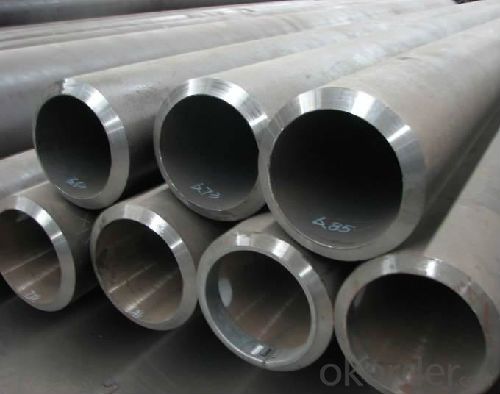
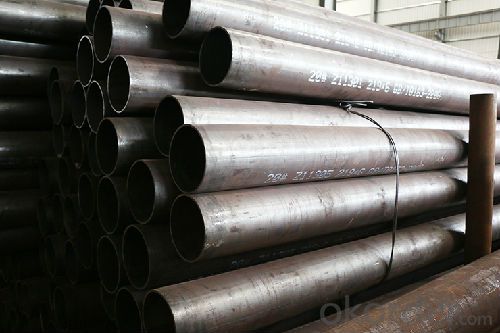
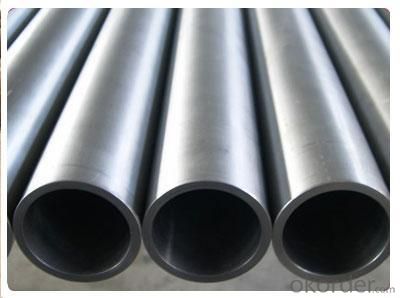
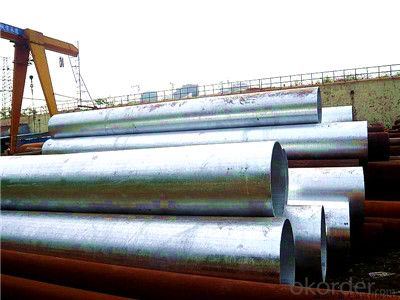
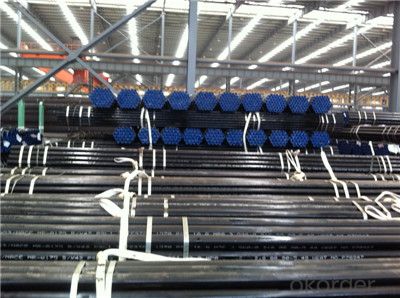
5.FAQ of Seamless steel pipe:
①How is the quality of your products?
Our products are manufactured strictly according to national and internaional standard, and we take a test
on every pipe before delivered out. If you want see our quality certifications and all kinds of testing report, please just ask us for it.
Guaranteed: If products’ quality don’t accord to discription as we give or the promise before you place order, we promise 100% refund.
②How about price?
Yes, we are factory and be able to give you lowest price below market one, and we have a policy that “ for saving time and absolutely honest business attitude, we quote as lowest as possible for any customer, and discount can be given according to quantity”,if you like bargain and factory price is not low enough as you think, just don’t waste your time.Please trust the quotation we would give you, it is professional one.
③Why should you chose us?
Chose happens because of quality, then price, We can give you both.Additionally, we can also offer professional products inquiry, products knowledge train(for agents), smooth goods delivery, exellent customer solution proposals.Our service formula: good quality+good price+good service=customer’s trust.
SGS test is available, customer inspection before shipping is welcome, third party inspection is no problem.
Any question, pls feel free to contact us !
- Q: How are steel pipes used in the infrastructure development?
- Steel pipes are widely used in infrastructure development for various purposes. They are commonly used for transporting water, oil, and gas, as well as for drainage systems and sewage networks. Steel pipes are also used in the construction of bridges, buildings, and highways, providing structural support and stability. Additionally, steel pipes are utilized in underground utilities, such as telecommunications and electrical systems. Their durability, strength, and resistance to corrosion make steel pipes a crucial component in infrastructure development.
- Q: How do steel pipes handle ground settlement?
- Steel pipes are known for their strength and durability, making them capable of handling ground settlement effectively. Due to their rigid nature, steel pipes are resistant to deformation or collapse caused by uneven settling of the ground. This makes them a reliable choice for underground installations, as they can withstand and navigate through the changes in the ground surface without compromising their structural integrity.
- Q: Can steel pipes be used in earthquake-prone areas?
- Yes, steel pipes can be used in earthquake-prone areas. Steel has high tensile strength and can withstand seismic forces better than other materials. Additionally, steel pipes can be designed to be flexible and resistant to bending and cracking during earthquakes, making them a suitable choice for infrastructure in such areas.
- Q: How are steel pipes used in the power generation industry?
- Steel pipes are extensively used in the power generation industry for various purposes, such as transporting steam, water, and other fluids in power plants. They provide a reliable and durable solution for the high-pressure and high-temperature conditions found in power generation systems. Steel pipes are also used for the construction of boilers, condensers, and heat exchangers, ensuring efficient heat transfer and energy production. Additionally, steel pipes are employed in the exhaust system of power plants to safely and efficiently discharge emissions. Overall, steel pipes play a critical role in the power generation industry by facilitating the transportation of fluids and contributing to the reliable and efficient operation of power plants.
- Q: What is the purpose of pipe flanges in steel pipes?
- The purpose of pipe flanges in steel pipes is to provide a secure and leak-proof connection between two pipes or fittings. Flanges act as a connection point, allowing easy assembly and disassembly of pipes while ensuring a tight seal to prevent any leakage or loss of fluid or gas.
- Q: What are the different methods of bending steel pipes?
- There are several methods of bending steel pipes, including hot bending, cold bending, induction bending, rotary draw bending, and hydraulic pipe bending.
- Q: What is the role of steel pipe manufacturers in sustainable development?
- Steel pipe manufacturers play a crucial role in sustainable development by promoting environmental responsibility, resource conservation, and reducing carbon emissions. They contribute to sustainable development by adopting cleaner production techniques, recycling waste materials, and investing in research and development to improve energy efficiency. Additionally, they prioritize worker safety and adhere to stringent quality standards, ensuring the durability and longevity of their products, which further supports sustainable construction practices.
- Q: Can steel pipes be used for conveying solid materials?
- Yes, steel pipes can be used for conveying solid materials. Steel pipes are commonly used in industries such as construction, oil and gas, and mining to transport solid materials such as ores, coal, grains, and various other solid substances. The durability and strength of steel make it suitable for handling the weight and pressure of solid materials during transportation.
- Q: How do steel pipes handle seismic activities?
- Steel pipes are highly durable and flexible, making them well-suited for handling seismic activities. The inherent strength and elasticity of steel allow the pipes to withstand ground movements during earthquakes without fracturing or collapsing. Additionally, steel pipes can absorb and distribute seismic forces throughout their structure, reducing the risk of damage or failure.
- Q: What are the different types of steel pipe nipples?
- There are several different types of steel pipe nipples that are commonly used in various applications. These types include seamless, welded, threaded, and grooved steel pipe nipples. 1. Seamless steel pipe nipples: Seamless nipples are manufactured from a solid piece of steel without any seams or joints. This type of nipple is often preferred for high-pressure or critical applications due to its superior strength and reliability. Seamless nipples can be threaded or plain-ended, depending on the specific requirements. 2. Welded steel pipe nipples: Welded nipples are made by joining two or more pieces of steel together through welding. This type of nipple is commonly used in non-critical applications where high pressure is not a concern. Welded nipples are available in both threaded and plain-ended options. 3. Threaded steel pipe nipples: Threaded nipples have external threads at one or both ends, allowing them to be easily connected to other threaded fittings or pipes. These nipples are commonly used in plumbing, water supply systems, and other applications where a secure and leak-free connection is essential. Threaded nipples are available in various lengths and diameters to accommodate different requirements. 4. Grooved steel pipe nipples: Grooved nipples have a groove or indentation around the circumference of the nipple, which allows for easy installation using grooved couplings. This type of nipple is commonly used in fire protection systems, HVAC systems, and other applications where quick and efficient installation is necessary. Grooved nipples are available in various sizes and configurations to suit different piping systems. In summary, the different types of steel pipe nipples include seamless, welded, threaded, and grooved nipples. Each type has its own advantages and is suitable for specific applications. It is important to consider the specific requirements and conditions of the project before selecting the appropriate type of steel pipe nipple.
Send your message to us
2016 high quality CNBM seamless steel pipe
- Loading Port:
- Tianjin
- Payment Terms:
- TT or LC
- Min Order Qty:
- 100 m.t.
- Supply Capability:
- 3000000 m.t./month
OKorder Service Pledge
OKorder Financial Service
Similar products
Hot products
Hot Searches
Related keywords
